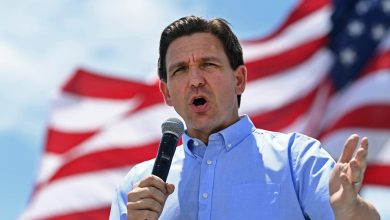Poll Shows RFK Jr.’s Growing Appeal Among Republicans While Losing Support Among Democrats

New polling data reveals a surprising trend for Robert F. Kennedy Jr. (RFK Jr.), as his popularity rises among Republican voters but experiences a sharp decline among Democrats. The sharp political divide surrounding his name is a testament to the polarization that has gripped American politics.
RFK Jr., the son of the late Senator Robert F. Kennedy and nephew of President John F. Kennedy, has long been a prominent figure in progressive circles. His advocacy for environmental issues, especially his focus on vaccination safety, has earned him both admiration and criticism. However, recent trends indicate a major shift in public sentiment towards him.
A poll conducted by a reputable research firm shows a significant increase in RFK Jr.’s approval rating among Republican voters. This comes as a shock, considering his affiliation with the Democratic Party and his history of supporting progressive causes. One possible explanation is his vocal opposition to COVID-19 vaccine mandates and skepticism towards vaccine safety, which has resonated with many conservatives.
RFK Jr.’s stance on vaccines has been met with fierce opposition from the scientific community, which overwhelmingly supports their safety and efficacy. Nevertheless, his vocal criticism of vaccine mandates and his calls for more research into their potential risks have struck a chord with a segment of Republican voters who view vaccine requirements as an infringement on personal liberties.
Conversely, Democrats have become increasingly disillusioned with RFK Jr. and his controversial stance on vaccines. The democratic base, traditionally supportive of vaccination and scientific expertise, views his skepticism as a threat to public health and a misrepresentation of facts. This has resulted in a sharp decline in his approval rating among Democrats.
The data highlights a deep divide between the two major political parties regarding vaccine mandates and public health policies. While Republicans are swayed by RFK Jr.’s arguments about personal freedoms, Democrats see his opposition as a dangerous influence that undermines efforts to combat the pandemic and protect vulnerable populations.
The phenomenon of RFK Jr.’s rising popularity among Republicans is a clear indication of the growing influence of anti-vaccine sentiment within conservative circles. Recent years have witnessed an increase in vaccine hesitancy, often fueled by misinformation and conspiracy theories. RFK Jr.’s alignment with these sentiments demonstrates the widening ideological gap between the parties.
It is essential to recognize that RFK Jr.’s fluctuating popularity is not solely driven by his vaccine-related views. His advocacy for environmental issues and his efforts to fight against corporate influence have also contributed to his polarizing image. Nevertheless, it is his rejection of mainstream scientific consensus regarding vaccines that has propelled him into the national spotlight.
As the political landscape in the United States becomes increasingly polarized, RFK Jr.’s shifting approval ratings reveal a deeper problem: the erosion of trust in institutions and experts. Democrats and Republicans seem to prioritize their own interpretation of facts, driven by ideological biases and partisan tropes. This division impedes progress on crucial issues, such as public health and climate change, as politicians and public figures become symbols of rivalry instead of catalysts for change.
As RFK Jr.’s popularity continues to rise among Republican voters and decline among Democrats, it becomes evident that the national conversation around vaccines, public health policies, and scientific consensus demands a more nuanced and informed approach. Bridging this gap will require dialogue, evidence-based arguments, and a concerted effort to restore trust in experts and institutions.




